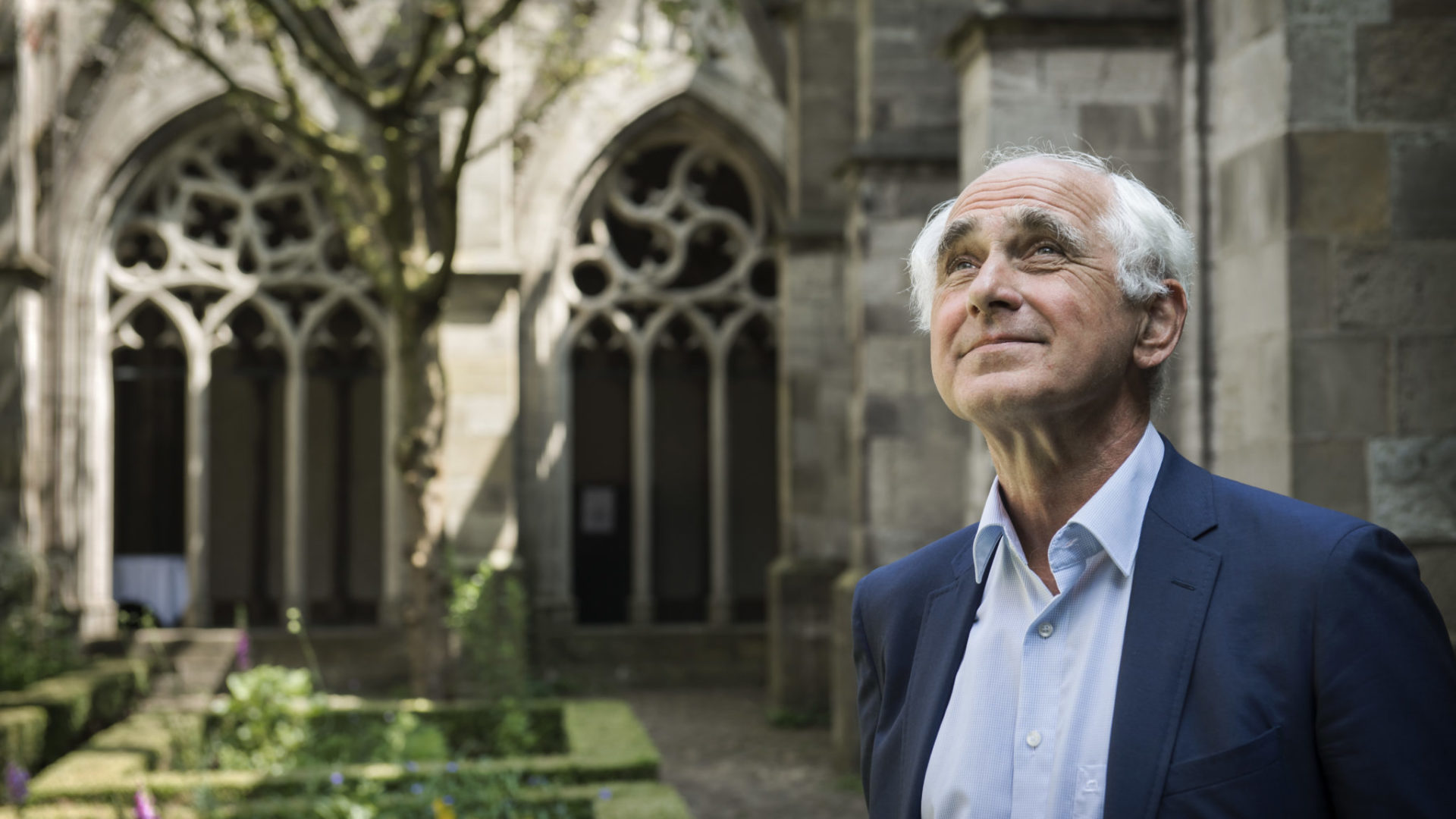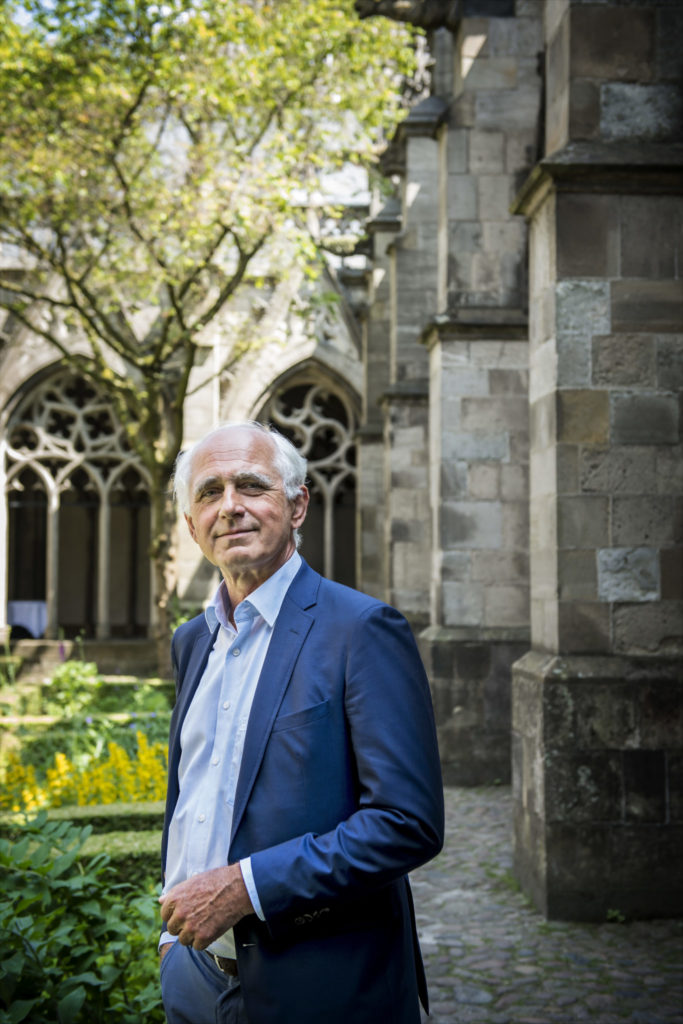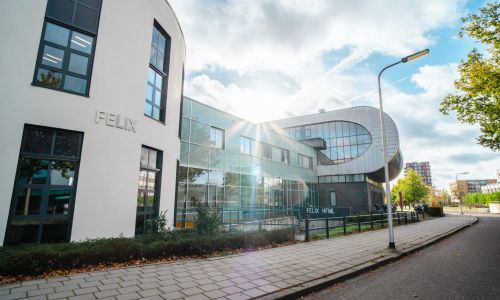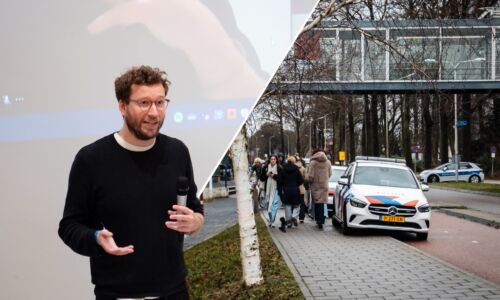Summer interview (5): former Rector Bert van der Zwaan
Bert van der Zwaan quotes make good newspaper headings. ‘More selection at the gate’, ‘We have too many students’, ‘Where’s our Harvard in the polder?’ But these statements often mask a nuanced argument, claims the former Rector of Utrecht University.
As he leads the interviewers to the walled garden of the Utrecht Faculty Club, Bert van der Zwaan stops to shake a number of hands. Acquaintances ask how he’s been since resigning after eight years as Rector of Utrecht University last March. For example Thom de Graaf, Chair of the Vereniging Hogescholen (Association for Universities of Applied Sciences) – who happens to also have an appointment in the Academy Building, ‘the beating heart of the University’, on the Domplein.
Van der Zwaan has just returned from a family holiday in Andalusia and in the brief friendly chats with his former colleagues he confesses almost guiltily to spending a lot of time in the garden. People respond that it sounds wonderful, and isn’t that what retirement is all about? You can’t keep on going forever.
Not that Van der Zwaan is standing still: he’s currently writing two books – one on research and one on the future of the university.
‘It’s not feasible with our current budget to have all our universities reach the top’
Once upon a time, Van der Zwaan was Professor of Biogeology in Nijmegen. After leaving for Utrecht in 2003, he soon landed himself an administrative position. First as Dean, then in 2011 as Rector. What he missed most during those years was fieldwork. And this is what he’s picked up again, this time together with his wife Wilma Wessels. Wilma is a palaeontologist, but while Van der Zwaan, as a marine geology specialist, opted for destinations around the Mediterranean and the oceans, rodent-expert Wessels mostly worked in countries like Russia, Mongolia and Turkey. This month they are going to the Balkans together, to do research, and in Van der Zwaan’s case, also some climbing. A hobby he took up on this first fieldwork trip as a student: ‘It took me five days to reach Spain with my Renault 4. It wouldn’t go faster than 80 kilometres an hour, with ditch water in the radiator.’
Bio
Bert van der Zwaan was born in Voorschoten (1952). He studied Geology at the VU University Amsterdam and completed his degree and PhD at Utrecht University. He worked as a Professor in Nijmegen from 1991 until 2003. After that, Van der Zwaan left for Utrecht, where he took the position of Rector in 2011. In March of this year, he retired.
Under Van der Zwaan, Utrecht University was headed by a researcher unafraid to voice his own opinions. Following interviews about his book Haalt de universiteit 2040? (Will the university live to see 2040?) (2016), national press journalists avidly listened to his claims to the effect that the Netherlands had too many university students, that universities should select more stringently at the gate, and that the Netherlands would do well to develop one university into a top institution – a kind of ‘Harvard in the polder’. It’s pretty obvious that statements like these would cause minor earthquakes in the Netherlands, with its egalitarian education system.
You argue for a differentiated academic landscape in the Netherlands. In what way?
‘In every way, actually: I would like universities to distinguish themselves in terms of their signature, size, and status. The Dutch education system is completely egalitarian. If one university gets government funding, all the others have to follow suit. Don’t get me wrong: anyone who says Dutch education is bad should look again. In the 1970s, that’s when it was bad. But as things stand we are slowly dropping away from the world top, and I see this as a serious threat.
It’s not feasible with our current budget to have all our universities reach the top. It would be better to differentiate the function of universities: you could for instance distinguish between teaching and research universities. Everyone thinks that Utrecht University is out to become a top university – which is true, by the way – but I believe differentiation will help the entire Dutch educational system to function better.’
Are these teaching and research universities meant to be serving different kinds of students?
‘It’s a fact that many students end up in the wrong place and can’t make the most of their talents. Excellence programmes like the Honours Academy in Nijmegen are symptomatic of this: these students are not challenged enough by a regular university degree. This kind of programme shouldn’t be necessary – there should be a university for these students.’
You’re a proponent of selection.
‘The media often quote me saying that I’m all for selection. This isn’t quite true. My theory is actually quite different. Student numbers have grown much too fast in recent years, while government funding per student has declined. Our educational system is under too much pressure. At this rate, we’ll soon see academic quality drop. I see two solutions. The best one is to give universities more money. But I don’t see that happening anytime soon. If they don’t get more money, then selection might be a good option – because it helps to regulate student inflow, so students end up in the right place.
Selection is also unavoidable to maintain a balance between Dutch and international students. I’m very much in favour of quality – I want to attract the top students, but the international classroom has to be really diverse. A Dutch study programme with 90% of students coming from China is something I find hard to swallow.’
The fear of Nijmegen Rector Han van Krieken is that selection will exclude certain social groups, for example students from disadvantaged families. What would you say to him?
‘That he should take a good look around and see that we can’t go on like this: our system is completely overloaded. We’re actually on the same page, except I’m not afraid of selection. It could have a very positive effect.
In Utrecht, even without selection we’re getting too few disadvantaged students. We see that obstacles are not based on intellectual abilities, but on social context. At the University, we have lots of people who don’t feel at home intellectually, but they’re being pushed by their parents, and have the money to afford exam training programmes and remedial teaching. Many social groups – refugees, people from disadvantaged families – do have the intellectual capacity, but end up being excluded.
Together with my wife I created a fund for refugees and other disadvantaged groups. With this money, language courses can be offered in districts like Overvecht and Kanaleneiland: many people there have poor language skills, so they will never make it through the selection procedure for a programme like Law, which is very language-oriented.’
Sodom and Gomorrah
Van der Zwaan grew up in Voorschoten, where his father worked his way to the top in a silver factory. A very confessional environment, an ARP (Anti-Revolutionary Party) family – not street-poor, but certainly not rich. Van der Zwaan was the first child to study, encouraged by his parents. He was good at languages and was told to focus on the humanities, but after reading Darwin, there was no going back. ‘I was seventeen, and I enrolled at the VU University Amsterdam, home to the most modern geology faculty of the time. Amsterdam was a bit the Sodom and Gomorrah of the Netherlands in those days: there was so much going on, including the occupation of the Maagdenhuis.’ After graduating – in less than six years, a unique feat in those days – he went to Israel to pick bananas in a kibbutz. It was during this year that he realised what he really wanted to do was to become a researcher.
Were you an ideal student? You completed your studies in record time, particularly for that period, and you got a perfect mark (10) for your final examination in Dutch language and literature.
‘Well … Looking back, I could have learned much more from my student days. I had to have a job to pay for my studies, and I was much too pragmatic: I aimed for seven or higher, but never strove for perfection.
I was a typical student from a disadvantaged background. In the 1970s the university was a much more elitist environment than now, and there were relatively few students. My parents were on the lower end of the average income. This made me pretty insecure, and the professors did nothing to boost my self-confidence. They just threw a book at me and told me to figure it out. What I missed was the opportunity to enjoy doing research with confidence.
University students should be driven by curiosity and not the fear of getting it wrong. I find it problematic when students don’t have an opinion, or when they ask: ‘So, what’s the right answer?’’
Students nowadays suffer from stress and loneliness. As a former Rector, does this worry you?
‘There’s no real evidence that the reason is study-related. Students are fairly representative of young people in general. So I think we have to look at this problem from a much broader perspective. Young people these days have busy agendas with jobs, lots of ambition, and social obligations from here to Tokyo. The fear of social media leads to a kind of impoverishment. The progressive digitalisation of education, with physical campuses losing their importance, only reinforces this problem. I believe my role as Rector was to take a very clear stance on this. To stimulate the debate in order to formulate a collective norm awareness. It is also the university’s role to make young people better citizens.’
From 1991 until 2003 you were Professor at Radboud University. Before that you worked as a lecturer at Utrecht University, where you returned after leaving Nijmegen. Do you see major differences between the two universities?
‘I couldn’t believe my ears when I first came to Nijmegen. In Utrecht, colleagues and students were always loudly complaining about everything. In Nijmegen, where I was appointed Professor at a very young age, there was an incredibly pleasant and friendly atmosphere. There was an annual professors’ dinner and my colleagues were almost un-Utrecht like in their collegiality. The world I was coming from was much more abrasive.’
Does Nijmegen lack a certain critical attitude?
‘You might indeed ask yourself that. Things have evened out in the meantime, but there was a difference. A middle ground between Utrecht – too critical, lots of complaining – and Nijmegen, at times too friendly, would be ideal.’
Imagine you had been appointed Rector in Nijmegen. What would you have focused on?
‘At the time, in 2000, my close colleague Kees Blom (Professor of Ecology, eds.) was appointed Rector. In those days Radboud University was a much smaller, more regional university, which was something Kees and I used to discuss before our appointments. There was less quality assurance, the appointment policy for professors was at times questionable – the Roman Catholic background still played an important role in this context. Such practices are unthinkable in the international field. Blom tackled this, and the audit committees that were introduced across the Netherlands in the 1990s also greatly improved quality. Yes, these steps really helped Radboud grow.’
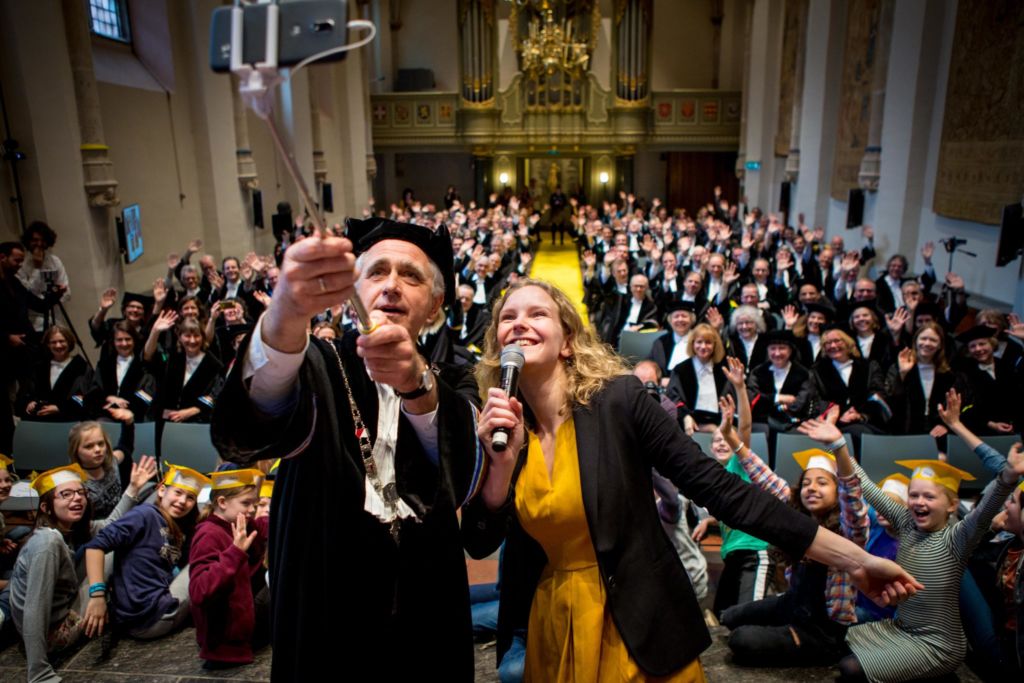
‘In terms of administration, I see that faculties in Nijmegen often just do their own thing. Utrecht is much more centrally organised, with sharper business processes. Look, of course, as long as consensus is possible, you should go for it. It’s incredibly important to have a base of support within your university, but sometimes you just have to make decisions.’
In Haalt de universiteit 2040? (Will the university live to see 2040?) Van der Zwaan argues that although we live in a highly digitised society, geography and regionalisation play an ever-increasing role in the education system. He speaks of the importance of knowledge hubs, metropolitan regions where universities work closely together to collectively improve the quality of what they offer. Van der Zwaan predicts that London will become the most important European knowledge hub (‘even though we’ll have to wait and see what happens after Brexit’). The Randstad region could grow into the second European hub, possibly in collaboration with the Flemish universities.
Haalt de universiteit 2040? doesn’t mention Radboud University at all. Does Nijmegen have to ‘join in or perish’?
‘The jury is still out on that. It’s not too late for Nijmegen, but I see a regional collaboration arising on a smaller scale between universities in Zuid-Holland (Leiden, Rotterdam and Delft), between the two Amsterdam universities, and between Utrecht, Eindhoven and Wageningen. These three blocks make up the Randstad hub. It would make sense for Nijmegen to collaborate with the Utrecht and Eindhoven region – to create a triangle. But this requires a lot of effort, and it’s difficult to bridge the physical distance. Nijmegen could also look in the other direction: towards Twente and Munster.’
Geographically, Nijmegen falls outside the Randstad region, and therefore outside the knowledge hub. In this sense, your plea for a differentiated system sounds like a threat to Radboud University: Is our only option to be ‘just’ a teaching university?
‘This development poses a potential threat to all universities, including Nijmegen. One solution is for universities to complement each other. One focuses on one specialisation, the other on another. Utrecht University and Radboud University are already largely complementary: our science faculties and humanities faculties are very different. This kind of complementarity could form the basis for collaboration. But it’s difficult – Dutch universities haven’t taken many steps in this direction yet.
Look, we can’t keep on going like we are now. The question is whether the Netherlands can afford to keep thirteen broad universities without a single one of them being in the world top 10. The university is a brilliant environment, which still offers a great deal of freedom. And research is all about hard work, blood, sweat and tears.
But I’m also saying: the ever-expanding university, with less and less money per student and therefore increased work pressure on the staff, will collapse one day – we can’t keep demanding more from our researchers.’
